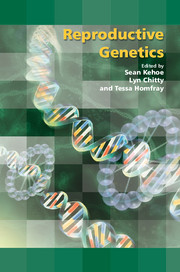10 results
Chapter 35 - Genetic Screening and Diagnosis
-
-
- Book:
- Part 1 MRCOG Synoptic Revision Guide
- Published online:
- 27 July 2023
- Print publication:
- 06 July 2023, pp 337-349
-
- Chapter
- Export citation
Consensus document on optimal management of patients with common arterial trunk
- Part of
-
- Journal:
- Cardiology in the Young / Volume 31 / Issue 6 / June 2021
- Published online by Cambridge University Press:
- 21 May 2021, pp. 915-939
-
- Article
- Export citation
Participants
-
- Book:
- Reproductive Genetics
- Published online:
- 05 February 2014
- Print publication:
- 01 November 2009, pp vii-ix
-
- Chapter
- Export citation
Index
-
- Book:
- Reproductive Genetics
- Published online:
- 05 February 2014
- Print publication:
- 01 November 2009, pp 221-232
-
- Chapter
- Export citation
9 - Fetal dysmorphology: the role of the geneticist in the fetal medicine unit in targeting diagnostic tests
-
-
- Book:
- Reproductive Genetics
- Published online:
- 05 February 2014
- Print publication:
- 01 November 2009, pp 131-146
-
- Chapter
- Export citation
Frontmatter
-
- Book:
- Reproductive Genetics
- Published online:
- 05 February 2014
- Print publication:
- 01 November 2009, pp i-iv
-
- Chapter
- Export citation
17 - Consensus views arising from the 57th Study Group: Reproductive Genetics
-
- Book:
- Reproductive Genetics
- Published online:
- 05 February 2014
- Print publication:
- 01 November 2009, pp 217-220
-
- Chapter
- Export citation
Contents
-
- Book:
- Reproductive Genetics
- Published online:
- 05 February 2014
- Print publication:
- 01 November 2009, pp v-vi
-
- Chapter
- Export citation

Reproductive Genetics
-
- Published online:
- 05 February 2014
- Print publication:
- 01 November 2009
Declarations of personal interest
-
- Book:
- Reproductive Genetics
- Published online:
- 05 February 2014
- Print publication:
- 01 November 2009, pp ix-x
-
- Chapter
- Export citation

